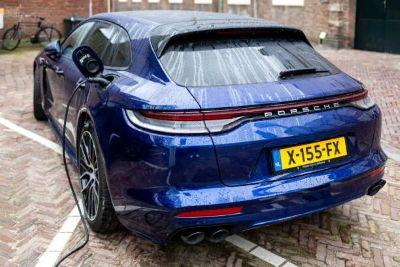Sponsored
Waterproof EV Chargers: Are They Safe to Use in the Rain?

Can You Charge an Electric Car in the Rain? A Complete Guide to Waterproof EV Charging
As a trusted EV charger manufacturer in China, Topper Company delivers reliable electric vehicle charging station equipment and comprehensive solutions.
Electric vehicles (EVs) are no longer a novelty—they’re becoming a mainstream choice for drivers around the world. As governments and consumers alike prioritize cleaner transportation, EVs are fast replacing traditional gas-powered cars. But with this shift comes a new set of questions—especially when it comes to charging safety.
One of the most common concerns?
“Is it safe to charge my electric car in the rain?”
It’s a valid worry. After all, electricity and water don’t typically mix. But here’s the good news: charging your EV in the rain is completely safe—as long as you’re using certified, weather-resistant charging equipment.
In this guide, we’ll explore how waterproof EV chargers work, why Ingress Protection (IP) ratings matter, and how leading manufacturers like Topper are delivering reliable, all-weather charging solutions for homes and businesses.
Why Home EV Charging Is on the Rise
Installing a home EV charger isn’t just a matter of convenience—it’s about savings, flexibility, and long-term value. Charging at home, especially overnight, lets you take advantage of lower electricity rates and skip the wait times and peak fees often found at public charging stations.
Topper’s residential EV chargers are built specifically for outdoor environments. With waterproof enclosures, tamper-proof housings, and smart safety features, they’re designed for year-round use—rain, shine, or snow.
The Short Answer: Yes, It’s Safe to Charge in the Rain
Modern EV chargers are built with outdoor use in mind. They’re extensively tested to ensure they can withstand rain, snow, dust, and temperature extremes. Key safety mechanisms ensure that no electricity flows until a secure connection is made between your charger and the vehicle—eliminating the risk of shock or short-circuiting.
So, as long as your EV and charger are functioning properly and meet international safety standards, charging in the rain is completely safe.
What Are IP Ratings—and Why Do They Matter?
The safety and durability of EV chargers are often defined by their Ingress Protection (IP) ratings. These ratings, set by the International Electrotechnical Commission (IEC), indicate how resistant a product is to dust and water.
Common IP Ratings for EV Chargers:
-
IP65: Dust-tight and resistant to low-pressure water jets—ideal for general outdoor use.
-
IP66: Can handle strong water jets—suitable for harsher environments or heavy rain.
-
IP67: Offers protection against temporary submersion—perfect for areas prone to flooding or poor drainage.
When shopping for an EV charger, look for one rated IP65 or higher for outdoor installations.
Built-In Safety Features for Outdoor Charging
High-quality EV chargers come with multiple layers of protection to ensure safe use in any weather:
-
Sealed Charging Connectors
Special rubberized seals prevent moisture from reaching the internal pins. -
Weatherproof Housings
Durable, UV-resistant enclosures protect the electronics from rain, dust, and impact. -
Smart Charging Protocols
Chargers communicate with your EV to confirm a safe connection before sending power. -
Leakage Detection (RCDs)
Built-in residual current devices automatically cut power if a fault or water ingress is detected. -
Temperature Monitoring
Thermal sensors prevent overheating during extreme weather or long charging sessions.
Installation Location Still Matters
Even the most weatherproof charger performs best when installed thoughtfully. Here are a few best practices:
-
Avoid low-lying areas prone to water pooling or flooding
-
Install under a covered space (like a carport or overhang) for extra protection
-
Mount on a pedestal with proper drainage if wall space isn’t available
-
Elevate slightly above ground to reduce splash exposure and cable wear
A well-placed charger not only enhances safety but also extends the life of your equipment.
How Waterproof Chargers Are Tested
Before being released to the market, waterproof EV chargers go through extensive testing to ensure durability:
-
Water Jet Testing: Simulates heavy rain and hose exposure
-
Submersion Tests: IP67-rated units are submerged to confirm watertight design
-
Dust Chamber Tests: Simulates outdoor air particles
-
UV & Temperature Tests: Ensures resistance to sun, snow, and extreme heat
-
Impact Resistance: Tests housing durability against drops or collisions
Only chargers that pass these evaluations and earn certifications like UL, CE, or TUV are approved for installation.
Weatherproof vs. Waterproof: Know the Difference
-
Weatherproof means the charger can handle outdoor elements like rain and wind.
-
Waterproof means it can resist more extreme conditions, including short-term submersion.
For most homes, a weatherproof charger (IP65+) is enough. But in high-risk areas—such as flood zones—a fully waterproof (IP67) unit offers extra peace of mind.
Smart Features That Boost Safety and Convenience
Many waterproof EV chargers today come with smart technology for added control and monitoring:
-
Remote start/stop via mobile app
-
Real-time charging updates and fault alerts
-
Usage and energy reports
-
Overload and short-circuit detection
-
Scheduled charging to save money during off-peak hours
These features give users better visibility and control—especially useful in bad weather when you’d rather stay indoors.
Topper’s Approach to Safe, All-Weather Charging
At Topper, we design our chargers to handle whatever nature throws at them. Our waterproof EV charging stations are tested under extreme conditions and built to meet the world’s most rigorous safety standards.
From IP67-rated enclosures to app-based smart features and personalized installation support, we make sure our customers can charge with confidence—no matter the weather.
Final Thoughts: Charging with Confidence
Thanks to modern technology, the idea that rain and EV charging don’t mix is officially outdated.
With waterproof designs, advanced safety systems, and professional installation, charging your electric car in the rain is as safe as doing it on a sunny day.
So next time storm clouds roll in, there’s no need to worry—just plug in and power up.
Because with the right charger, driving electric works in every season.Know more about Google SEO Directory



